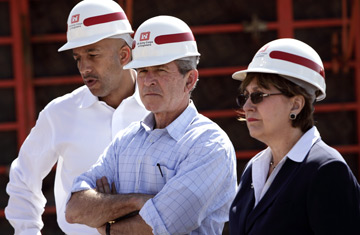
U.S. President George W. Bush looks up as he tours the rebuilding of a levee in New Orleans with New Orleans Mayor Ray Nagin and Louisiana Governor Kathleen Blanco.
The number one thing for New Orleans at this juncture is to truly begin to be able to derive the funds from the federal government to do what has been promised: re-establish the destroyed infrastructure in this community. Seventy percent of this city was under water. The infrastructure collapsed. The city has been without significant capital funding to be able to solve those issues. Until the city can begin to derive those dollars, it is going to be very difficult for there to be a lot of confidence in this city and for a truly significant construction effort to begin.
We're two years down the road, and the discussions are just beginning. They revolve around such questions as, "What was the state of the sewage and the water systems before the storm?" But that is dancing on the head of a pin. How do you make that determination? If that's the type of inquiry we are forced to deal with, I would suggest we are not dealing with people who are really trying to fix a problem, but rather who are trying to raise issues to avoid a problem.
You have to understand the magnitude of this catastrophe. It's as if seven Manhattans were under water for two weeks. The President said, "We're going to bring it back." But now we hear, "Well, we've given you enough money." At what point do you spend enough? At 10% of the damage? At 20%? 50? Or 100 percent? If a man says he's going to bring it back to the way it was, that, to me says more than just ten or 20 percent.
I think the nation — by virtue of what the President said and what others said and what they've done in other communities, where they have done what is necessary to bring the communities back — has an obligation. We going to have to decide what is our national priority. We're not there yet.
King Milling is the vice chairman of the Whitney National Bank.